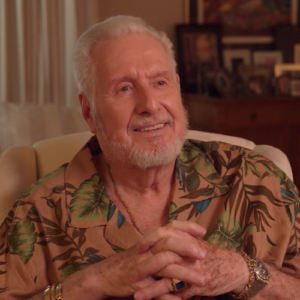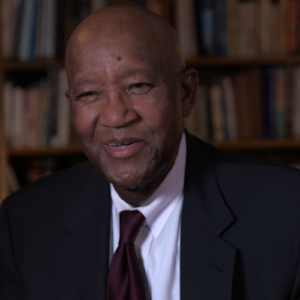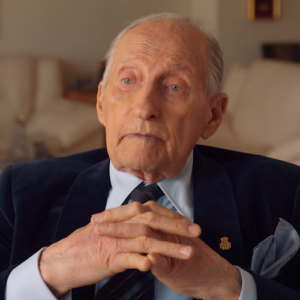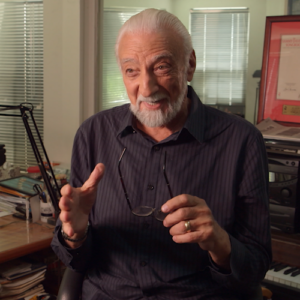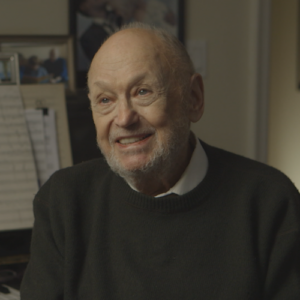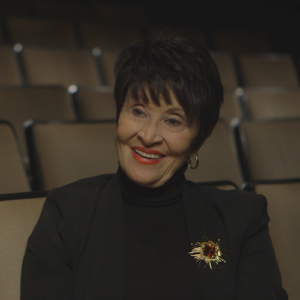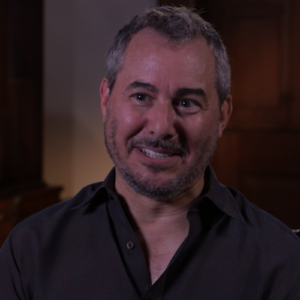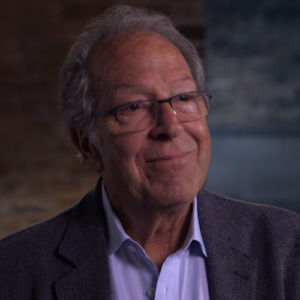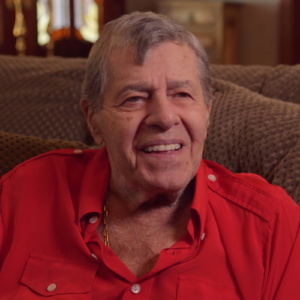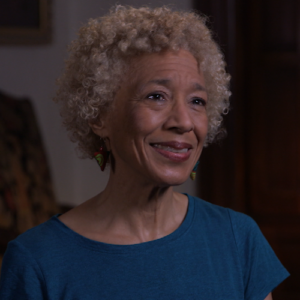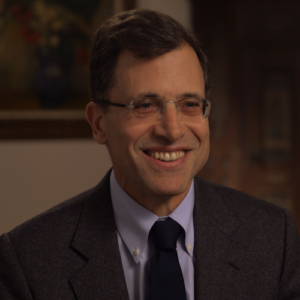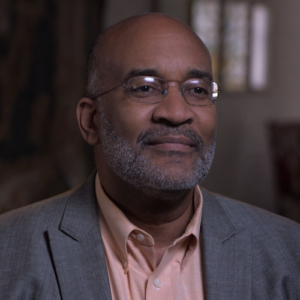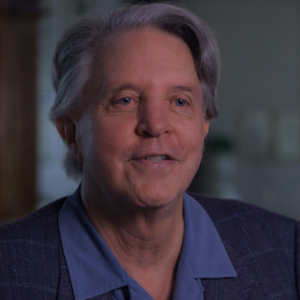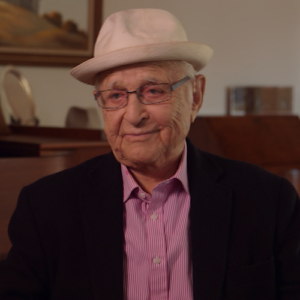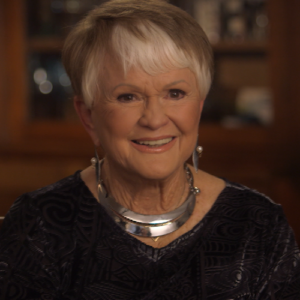Jason King: I think I was first aware of Sammy Davis Jr. You know, I was young. I grew up in Canada and, you know, I wanted to be in theater, so I wanted to sing. I wanted to dance, I wanted to act. I came to New York to do that. And Sammy Davis was he was the figure. He was the person that you looked up to as a total triple threat, somebody who could do everything and do it at such a high level of excellence that it’s almost like I don’t ever remember him not being a part of my consciousness. He was the kind of thing that you aimed to be in life just to be that good and to be that powerful in every aspect of what you did as a performer.
Interviewer: You remember one specific event, a show that you saw, and one that he really liked you and what he was doing.
Jason King: Yeah, for me, the I mean, there you go. Yeah. There’s so many the what would you call again. The TV before that. Yeah. So early. Sorry. Okay. The TV performance that really knocked me out with Sammy Davis Jr is his performance on the Flip Wilson show of Mr. Bojangles. And the reason it does is actually I still look to it as a example of great performance and what one can do masterfully in a performance. And the reason for that is every single moment is accounted for in that performance. So every hand gesture, every gesture of his hip, every time he moves his feet in a particular way, every moment of the song is accounted for. And that’s very hard to do in performance because, you know, you can be worried about the lights of the audience and all kinds of things. All kinds of different external elements can make you forget where you are in a given moment. But he’s so connected in that performance and he’s really an essayist of song, meaning that he takes that song which is not originally written for him, not even really about Bojangles Robinson in a certain kind of way. And he takes it and he turns it into something completely different. And it’s so beautiful and so haunting and he brings so much dignity to it.
Interviewer: You really love that song?
Jason King: I love that. I love his performance of that song. I just I’ve never seen anybody perform it that well. And also, it’s a tricky song because, you know, it was a song that was written about a washed up dancer who was in a jail cell, and Sammy is singing about that washed up dancer. But, you know, through the way that he performs it, he’s also singing about himself in the way that he was perceived at the time. And it contains this kind of defiance that I think is something that also defined who Sammy Davis Jr was, this quiet defiance and this sort of dignity despite the washed up ness. And to be able to do that, to make the song register on so many different levels is the mark of a classic essayist. Lena Horne could do that. Sammy could do that, Liza minnelli could do that, Judy Garland could do that. The classic performers all had that quality that Sammy Davis had in spades.
Interviewer: Those are the acts of some of these other songs, like I Going to Be Incredible.
Jason King: I mean, Sammy, my I Got To Be Me is one of Sammy Davis most incredible songs. You know, the thing that really differentiates him from somebody like a Frank Sinatra is that, you know, he never had song writers just write for him. He was a great interpreter of other people’s songs, but he didn’t have, you know, Kander and Ebb writing for Liza minnelli. He never came out of that tradition. So what he had to do was work with what he had, and he had these great songs by songwriters that he could turn inside out. He could get to the heart of the song and he could deliver it like an essayist. He would take the song and build it with this drama and suspense, which I think is the hallmark of a great performer. So I Got To Be Me is one of those like classic anthems, like My Way or something like that, which is about this sort of individualism and defiance. And I think it also captures the thing that makes Sammy Davis so great, which is his ability to not be a conformist, right? In the 1950s and 1960s, when conformity, especially in the fifties, when conformism was the mode, he is somebody who paved his own way. He carved his own path, and he did it in such a brilliant way. But I think I Got to Be Me is his anthem because he’s really it’s really about him at a certain point. And I think when a singer is able to take a song that’s written for somebody else and make it not only about them but their own anthem, that’s really that’s powerful.
Interviewer: So where would you play Sammy Davis Jr coming out of World War Two? I mean, we had, you know, Sammy, we had Sidney Poitier, Mr. Harry Belafonte, you know, all these great African American entertainers with with the Sammy stand, you know, of all these entertainers converging that the world went to, in your opinion.
Jason King: Sammy Davis Jr, his place in American history after World War Two is a little bit different than some of the other icons who were famous at the time, like a Harry Belafonte. A or a Sidney Poitier. Sammy Davis Jr was a child prodigy, so his career got started in the 1930s, right? Or even a little bit before he was already famous. He was on the road with his father and with Will Mastin. He like a michael Jackson or like any other child prodigy, spent a lot of his time performing. In fact, I think his whole consciousness was about performing. So I think maybe a little bit differently than some of the other icons. Sammy Davis never had a real kind of childhood or life outside of the stage. And so for him, his whole sense of being was about life on the stage. That adoration, that applause from the audience that validated it, validated him and allowed him to confirm who he was. I think that gave him a lot of problems later in life because the stage was the centerpiece for who he was. And if he wasn’t on stage, you know, it was very challenging for him. And he had to resort to all kinds of other things in order to make up for the insecurities and so on. But when he was on stage, nobody was better. And I think if you want to place Sammy Davis Jr in the context of other icons like a Sidney Poitier or Harry Belafonte, I think you have to look at him in the fifties where there was probably no other black entertainer who was as successful as mainstream and mainstream in all of the kind of circuits of American life, right? So that he conquered Las Vegas, which is something that not a lot of black entertainers were able to do even at the height of their success, and that he also had success in film, not just as a dramatic actor, but also as a comedian. And he was successful in music and he could do comedy, He could do drama. I mean, I’ve never seen and, you know, musicals on stage, dramatic plays. He could do it all and recordings. So I don’t know that we’ve ever seen anybody like Sammy Davis Jr There’s no multiple Sammy Davis Junior’s. There’s one Sammy Davis Jr Totally unique. There was never really a precedent before him, although he built his career on the image of other black singer dancers who were successful on the stage and off the stage like a bunny. BRIGGS Or a honey Coles or, you know, Al even Lena Horne or somebody like that. But he. Billy Eckstine But Billy wasn’t a dancer, right? So the ideal a singer. Absolutely. But the idea of, oh, Sammy Davis as a tap dancer, a jazz dancer, somebody who could do, you know, move in that way, that influenced an entire generation of other performers. So I guess you could compare him to maybe a Fred Astaire or Gene Kelly in that sense. But I think he went way beyond that in that ability to act and do dramatic work and do comedy. He’s almost like a standup comedian sometimes, too, right? In his work.
Interviewer: He was also an impressionist.
Jason King: An impressionist. Incredible impressions, not just of any figures, but all of his peers. So it’s really interesting the way that, you know, sometimes they could be extremely brutal to him on stage in a kind of joking way, but definitely attacking his race, his age, his, you know, his his height and those kinds of things. But he gave it back to them in the form of impressions, which is maybe the most that he could do at that time, given how limited the kind of movement of African-American actors and performers was in the 1940s and fifties and sixties where he couldn’t just say whatever you wanted about your oppression or suppression, you had to find new novel ways to do it through performance.
Interviewer: So one thing I think if I want to him, even though he started as a child prodigy, you know, along with his father and his uncle, they weren’t famous. So maybe you should say that did not make.
Jason King: It look like.
Interviewer: They were famous until, you know, like four years earlier. Oh, yeah. Like a phrase that he was different than fine. Okay, sure. Okay.
Jason King: So the original question was, what do you mean, context?
Interviewer: Where does he fit? Where’s he fit to as an African? I think he was like, you know, Harry and Sidney and Eartha KITT and Lena Horne, Nazism, Pearl Bailey.
Jason King: So many. Okay. All right. Sammy Davis Jr is a little bit different than some of the other icons of the 1940s and fifties, like a Harry Belafonte or Pearl Bailey or a Lena Horne or Sidney Poitier. Part of the reason for that is because he was a child prodigy. He started out very, very early age, around seven, performing with Will Mastin and with his father. He was on the road constantly. He never really had any other consciousness other than the stage and the road. So even though he and his father and the act that they were a part of weren’t really famous, and he didn’t really become famous until the 1950s, he had a little bit of a different upbringing than some of the other icons, right. That he is somebody who never had another reality other than the stage. And I think that is something that determined his entire life. When you look at the trajectory of his life, it’s really about a man who is striving for a certain kind of acceptance and assimilation into mainstream life who can never really quite achieve it.
Interviewer: That’s a great answer. Which leads to his you know, his reality was performing with problems. That being said, it is genuine.
Jason King: I.
Interviewer: You know, I mean, when I was reading his books. Yes, I can. You know, the second book is autobiography. I mean, he struggles with the idea that the black press, black people, as he was climbing up and assimilating, they were having issues with him and forgetting where he came from. Yeah.
Jason King: One of the things that I think is so profound that Sammy Davis Junior says is that, you know, I was a member of the black race, but I was not a member of the black community, meaning that he never really felt accepted by black people throughout his career, which is really interesting because he is somebody who gave a lot of money to civil rights causes to Martin Luther King. He dated black women. He also dated white women. He is somebody who just seemed to be sort of unbossed by the limitations of American identity. He wanted to do what he wanted to do. He was a sort of classic liberal in that sense. And, you know, he really, really struggled in terms of that acceptance by the black community because they saw him, I think, especially into the 1960s, as a sellout. And then for sure, in the 1970s, they saw him as somebody who had become disconnected from his race, somebody who was too close to a lot of white performers, somebody who had erred by dating interracially at a time in which legal segregation existed. So he was somebody who just was never fully accepted by the black community. I think probably until he died, at which point, you know, all is absolved and he becomes, you know, this sort of hero to the community again. But, you know, I think when you look at the history, there’s figures like Louis Armstrong, who was also seen by the 1970s as a kind of Uncle Tom figure, somebody who smiled a lot and sang to white people and was a figure associated with liberalism and also associated with a kind of assimilation that was not really, you know, didn’t really fit with the new times of the 1970s, which were very much about a certain kind of nationalism and, you know, a kind of embrace of African-American distinctiveness. And so Sammy Davis, you know, was a kind of anachronism already by the 1970s. He’s somebody who just didn’t fit.
Interviewer: In that moment. But even in the fifties, you know, he was not issues, you know, even in the fifties when he was just on the cusp of civil rights. You know, he was getting flack from, you know, the Amsterdam News and the Chicago Defender for not being black enough. Yeah. How come was an athlete so early? I mean, what’s also interesting to Jason is that, you know, he gets for me marry I want you to say marrying interracially not only dating now marrying him, but how his wife was white, you know, and pro Bailey’s husband was white, Willie Nelson. So how come they weren’t kissing all the hell that Sammy was concerned?
Jason King: Big questions. So Sammy Davis Junior’s lack of acceptance by the black community starts as early as the 1950s. And I think part of the reason for that is unlike some of the other performers of his time, like Harry Belafonte, Sammy is also connected to an earlier form of American entertainment, which is vaudeville, the tap dancing. He’s a brilliant tap dancer, but that for a lot of black people into the 1950s, as you see the rise of R&B and harder forms of music and rock and roll and so on, and of course, the rise of civil rights movements, vaudeville, that sort of shiny, happy jazz hands entertainment is seen as something passé and is seen as something that belongs to an earlier time. So even though the political goal is assimilation, people are very suspicious of black performers who smile too much.
Interviewer: Who does that? Southern pygmy Mark? You know, Miles, maybe we see those Stepin Fetchit kind of stuff. Yeah, You introduce that, including here.
Jason King: You mean like in the way that.
Interviewer: You say discussion going back? Sure, sure. Something being marketed in Moms Mabley?
Jason King: Yeah, yeah, yeah. I think for a lot of people in the 1950s, Sammy Davis represented an era that was bygone, and that was the era of vaudeville, where black performers had to make a lot of concessions. People like Moms Mabley or Pigmeat Markham or Gavin Crothers. These are people who did the best that they could with very, very limited options. But they were often seen as sort of kowtowing to white people or smiling in the face of white people, even though they internalized certain kinds of pain and so on. And I think by the 1950s already people had moved to a different model. R&B was extremely popular. Rock and roll was popular. There was a different energy. There was a different drive for assimilation, not just in music and entertainment, but also in politics. And I think for some, Sammy Davis Jr was an anachronism. He represented a different time in a time that a lot of people didn’t want to remember.
Interviewer: Exactly. And we should increase as the sixties and seventies.
Jason King: Oh, absolutely.
Interviewer: Yeah. Go back to that point about the sixties. With the advent of the Black Power movement in the seventies and nationalism, Sally was really seemed to fall off the.
Jason King: Okay. By the early 1960s, Sammy Davis Jr. Was supporting civil rights movements financially and in terms of his actual presence is there in Selma. He was there at some of these major marches, but yet at the same time, he still represented a kind of shiny, bright Las Vegas entertainment that had been connected to the history of tap dance and vaudeville and those kinds of things for African-Americans. And so a lot of people still saw him as a figure who was not modern, who represented an earlier era that a lot of people wanted to forget. And the sixties was a time marked by so much social and political political turbulence. But that said again, the sixties was a time marked by so much social and political turbulence. And there were so many changes in the African-American community as it moved toward increasing nationalism, increasing ways of trying to represent in a comment and account for the distinctiveness of African-American culture. And somebody like Sammy Davis was seen as really an assimilationist figure rather than a figure who represented a new spirit of the 1960s into the 1970s, which was this, you know, this nationalism, the desire to claim and honor distinctive aspects of black culture through the black arts movement in the late 1960s. And certainly by the time you get into the 1970s with the Rise of funk Music by James Brown, Bootsy Collins, George Clinton. A lot of the more aggressive and percussive changes that are happening in black music. Sammy Davis is singing Candyman. All right, so he’s singing a song that he didn’t even like. So he’s seen as this figure who really doesn’t represent the kind of non conformism that he used to represent. He’s just a figure who’s seen as a kind of puppet of white culture. And I think that’s really brought to the fore when he’s seen hugging Richard Nixon right on stage. And, you know, to be fair and to be clear, there were other black performers of the time in the 1970s who were also kind of close to Richard Nixon. So James Brown is one of those figures who supported Richard Nixon’s candidacy. Richard Nixon saw James Brown, his support of Black power, which Nixon, in his own warped mind, read as black entrepreneurship and capitalism. And so James Brown, you know, found a kind of synergy with Richard Nixon that a lot of people found disappointing and strange. But even James Brown wasn’t seen as the kind of sellout the Sammy Davis was at that moment when he was seen hugging Richard Nixon because he was seen as somebody who how could he possibly be supporting a figure who was so devastating to the black community who’d been behind COINTELPRO? So in all of these kind of, you know, horrible dismantling activities and, you know, black politics and culture and, you know, to see Sammy Davis up there was really shocking for a lot of people. And to some degree, it was the end of his mainstream career. From what I understand, Sammy Davis, his relationship with Motown was short lived. He wanted to be on that label because obviously it had been an incredibly important label, the 1950s and 1960s, for so many black performers and to deliver them to a kind of mainstream success. By the 1970s, Motown had already moved to Los Angeles, and it had become a different type of label. But I think Sammy was really interested in having hits. A lot of his hits and dried up. He wasn’t as successful anymore in terms of the recording thing. And so Motown for him was an option to try to get back and to become a figure of note in terms of music. It’s I think it’s this journey back.
Interviewer: This is your, you know.
Jason King: Yeah, There you go.
Speaker 3 You’ve got to get off.
Interviewer: Yeah, this needs to.
Speaker 3 Yeah.
Jason King: For me. It started. Okay.
Interviewer: Seven. Yeah.
Jason King: Recording The OC. I think Sammy Davis Junior wanted to sign to Motown because in terms of his recording career, it had largely dried up by the 1970s. He’d had hits previously, but he wasn’t having them anymore. And Motown was a label that he had known for a long time. He’d known a lot of the figures involved with Motown. Motown had been successful in delivering black acts to white audiences in a mainstream way, to a degree that had been unprecedented. And I think Sammy wanted to be associated with that label. Motown had changed a lot. It had moved from its original home in Detroit to Los Angeles and had become a very different type of record label with different leadership and so on. Even though Berry Gordy was still there, the CEO of Motown. But Sammy went to Motown because he thought it could bring him some success in the recording industry and it didn’t.
Interviewer: You think Harry has some of those because he knows where they get some of those recordings in the world? Sure. Yes.
Jason King: And if he if he doesn’t have them, nobody will have them. And Motown is extremely cataloged here.
Interviewer: So I’ll check with Gary.
Jason King: I can’t. But Candyman is the interesting song.
Interviewer: Mary was telling me or I can’t envisage. Interesting. So.
Jason King: Well, Candyman is a song from Willy Wonka and the Chocolate Factory, the film, and it wasn’t something that was specifically written for Sammy Davis, and he wanted to cover it on a record.
Interviewer: So that with the Bee Gees here spilling. Right. Okay. So.
Jason King: Yeah, Candyman was a song that was not is from Candyman is a song that was from Willy Wonka and the Chocolate Factory, the movie from the late 1960s. The song was not written for Sammy Davis Jr, but he was going to record it on his album, partly because it was just one of those songs that some people did and, you know, their Vegas sets and those kinds of things and cabaret. So we recorded it and to his surprise, it became a number one hits. One of his only number one hits, I’m not mistaken. And he hated performing the song. He didn’t want to be associated with the song because when you listen to it, it really is beneath Sammy Davis in a lot of ways, in terms of melody, in terms of sophistication. It’s a fun song and it’s something that, you know, I’m sure he was happy to have a hit with, but it’s not the kind of song that somebody with his controversial past. And also at that time in 1972, I believe it was. I mean, his relationship to the black community was very tenuous. And so to sing this song that is so happy, that is so, you know, it just seems like there’s no problems going on anywhere. And, you know, you know, Sammy was not that kind of person. He was somebody he was really concerned with what was going on in cities and riots and so on. So it was just one of those moments for him that it just didn’t fit with the image that he was trying to project. But yet it was a hit. And you see this throughout history. I mean, Bobby McFerrin in the late 1980s with Don’t Worry Be Happy, which then gets taken up and used as a song to like placate people in the Reagan era. Candyman was that song also in the 1970s that, you know, show the black people were happy and smiling and doing well when they weren’t.
Interviewer: Well, to talk about Sammy as a singer, I mean, you know, I’m very lucky Sammy song. I mean, like to me, like Sinatra. He covers a lot of the Gershwin, Rodgers and Hart standards. Yeah. Talk about a singer. Talk to me at least you think of him as a singing in the mouth of Sammy Davis. Sam was this.
Jason King: And I think Sammy Davis Jr is not as recognized as a sort of stand alone singer in the way that a Bing Crosby or especially a Frank Sinatra was. Frank Sinatra released these concept albums in the 1940s that were seen as the sort of pinnacle of what it meant to cover jazz songs and turn them into standards that were accepted in the mainstream. Sammy Davis Jr never really had that relationship to recordings. He made a lot of recordings. Some of them are exceptional, but he was never really associated with these classic standard songs, even though he was a great interpreter of them. There’s not one song that you can pin on Sammy Davis Jr and say, That’s his song, except maybe Candyman or or Mr. Bojangles, but that’s a little bit later in his career. So Sammy never really had that relationship to two classic songs. He never really had that relationship to classic albums. But as a singer, I think he’s absolutely incredible and part of the reason he’s so good, besides the fact that he sings and dances and plays instruments and acts and does everything, is the fact that he’s a great essayist of song, meaning it’s very, very hard to take a ballad and to be able to sing it all the way through and deliver it with suspense and drama and theatricality and build the song in the way that you would build almost a novel or short story. So it starts off maybe quiet and introspective and confessional, and then it builds and it’s got this great climax at the end that is a very, very hard thing to do and to also do it with great phrasing and to do it with great diction and great confidence and all of those kinds of things. And to put an inner life behind the song to the you’re not just singing the words, but you’re singing them with an emotionalism. So Sammy was just brilliant at that. So when you listen to his covers of like Anthony Newley songs like Oh, Who Can I turn to when you listen to his covers of Anthony Newley songs like Who Can I Turn To? You know, he turns these songs into these epic kind of, you know, emotional portrayals of insecurity and defiance and power. And I think it’s it’s it’s just such a great song. INTERPRETER And there are so many song interpreters who have kind of gotten underrecognized whether it’s a Shirley Bassey or a Leslie Uggams. A lot of black figures, in particular. Nancy Wilson. Yeah. So a Shirley Bassey and Nancy Wilson and Leslie Uggams. And a lot of these figures have been sort of underrecognized because they didn’t sort of fit the times, right? They weren’t the Motown singers. Two were cool and happened. They were young and, you know, breaking new ground. They were the figures associated with Broadway, The Great White Way. They were associated with a kind of assimilation ism that a lot of people found distasteful in the 1960s, including black people. And Sammy kind of represented that. But it doesn’t take away from the talent. The singing is astonishing and actually encourage anybody to go and listen to his 1966 recordings with oh, what’s his name? The jazz guitarist. Yeah. What’s his first name? Lorenzo. I was going to say Laurel. Yeah. I would actually encourage anybody to go and listen to Sammy Davis, his 1966 recordings with Lorenzo Olmeda, the jazz guitarist, because there’s just Sammy on vocals and Lorenzo on guitar. And the albums were styled in the way that Ella Fitzgerald had done guitar album with Joe passed, just very stripped down, very minimalist. And the whole focus is on the song itself and the performance of the song. And Sammy just kills those performances. I mean, they’re so beautiful, they’re so elegant. They’re so they’re so, you know, they just really capture this inner life that he had. And, you know, if anybody has any doubts about Sammy as a great vocalist, that’s what they need to go listen to.
Interviewer: Makes me think of Mr. Sinatra performing and performing with Antonio Conte. Of course.
Jason King: You know, they all did it.
Interviewer: And, you know, recently when I was working with Sinatra documentary, I saw a clip. I used the clip of Sammy. Doing that, which I thought was a terrible imitation of Sinatra. But talk about that musical connection between Mr. Sinatra and Mr..
Jason King: Frank Sinatra and Sammy Davis Jr were friends, so they clearly saw that there was something between them that was powerful and kind of magical. Just as friends who supported each other and performed together. And, you know, there was this lifelong kind of bond between them, even when Frank Sinatra didn’t want to speak to Sammy Davis Jr anymore because he was upset with his drug use and those kinds of things. But they were quite close as friends, and I think they were also close in terms of their performance style and what they could do. So in the 1940s, Frank Sinatra is seen as the figure who helped develop the idea of the standard right to take these jazz songs they’ve been written by, even at the time, classic songwriters like a Cole Porter, George Gershwin or Rodgers and Hart or any of these figures. And to be able to take those songs and turn them into classics, meaning his version was seen as the standard version by which all of the versions had to be measured to. And so that’s really what the standard was. And so Sammy Davis Jr, even though he wasn’t necessarily associated with the process of turning songs into standards, was a great standard singer. He could sing any of the classic songbook songwriters like a Rodgers and Hart or Gershwin or Cole Porter, you know. I mean, he was peerless, really, actually, in terms of that. So I think they should be seen as complementary figures in a lot of ways because they came out of the same tradition. But Sinatra, of course, gets all the glory. Sammy Davis doesn’t really get the glory for reasons that should be obvious. He was black. He was not handsome in the way that Frank Sinatra was perceived to be handsome. He was small in frame. He had to work very hard, was seen by a lot of people as a kind of hustler and sort of desperate for success. And that, you know, you could read it in the way that Frank Sinatra was cool, right? But part of his coolness was an Italian Americanness and Sammy Davis had no access to. So they’re unfairly contrasted with each other. But I think they should be seen as complementary figures, because.
Interviewer: As we all know, Sammy idolized Sinatra.
Jason King: He really adolescent achievement.
Interviewer: And yeah, maybe that was what made him feel like he could maybe musically not live up to something. I mean, I don’t know. I mean, I’m just. Yeah, express it.
Jason King: Well, I think the thing about Sammy Davis that’s so interesting is that he lived a kind of freedom that he didn’t yet politically or socially have access to. So even before segregation was banned in the country, he was living in a kind of total and absolute freedom in every aspect of his life. He didn’t see racial distinctions in certain kinds of ways. I mean, he knew that they existed and he was controlled by them in many ways and limited by them. But he was somebody who was already living as if he was in the racial utopia that he wanted to live in. And so I think his friendship with Frank Sinatra and also the way that he idolized Frank Sinatra, while some people saw it as kind of, you know, a strange thing or, you know, an assimilationist kind of move for Sammy Davis, I mean, he felt that he could become Frank Sinatra. He could become better than Frank Sinatra. He could become the best of all time. He could do anything. There’s nothing that you put in front of him that he couldn’t do. People talk a lot about Prince in that way, too. That Prince, you know, could do anything. He could play instruments. He could, you know, sing, he could dance, he could do all kinds of things. But if he saw that you had a talent that he didn’t have, he would study you until he absorbed your talent. And I think Sammy Davis Jr was really the template for that. He was somebody who wanted to master every aspect of American entertainment life. He wanted to have his own talk show. He wanted to, you know, be in films, dramatic films, comedic films. He wanted to, you know, be a great impressionist. You know, he could tap dance. He could do everything. It just seemed like there was no limits and no barriers. And I think that’s something that’s so powerful about who he is and what he represented, that he was a figure of this kind of freedom for a lot of people, including myself.
Interviewer: Well, so you would say that that would be the connection, you think, between Sammy and the prince?
Jason King: Oh, well, there’s many connections there talking about.
Interviewer: This connection to this area.
Jason King: I mean, Sammy Davis Jr to me is one of the greatest total entertainers of the 20th century. And by total entertainer, I mean somebody who has mastered multiple aspects of a performance tradition. So Sammy Davis Jr. As the dancers, the actors, the singer, that’s usually what’s meant as a triple threat. But it’s even deeper than that. With Sammy Davis, you can go even more granular. You can look at, you know, the tap dancing and the Broadway dancing and jazz dancing and dramatic acting and comedic acting. And there’s just so many layers to what made him a great performer. And so I think you can draw a very direct line from somebody like a Sammy Davis Jr who influenced influenced an entire you can draw very. Direct line from somebody like Sammy Davis Jr who influenced future generations of performers, including people like Jackie Wilson, James Brown. You never hear any credit they’re being given. But I think Sammy raised the bar so high in the 1950s and sixties for what it meant to be an entertainer. It’s really hard to imagine that the hardest working man in show business, James Brown, couldn’t have been inspired by the previous, hardest working man in show business, which was Sammy Davis Jr to me. I don’t know many performers who worked harder than Sammy Davis Jr. He was total artistic labor. So Sammy Davis Jr, I think in many ways is an influence, whether direct or indirect, to Jackie Wilson and James Brown, the total entertainers. And then certainly by the time you get to the 1960s and seventies, Michael Jackson, who’s a direct descendant of Sammy Davis Jr, all you have to do is watch a performance of Mr. Bojangles like the one he did on the Flip Wilson show, or ones that he did later in his life. And see how Sammy Davis holds that bowler hat, right? Which people often linked to Fozzie. But it’s not Fozzie. It’s really, you know, it’s Sammy’s kind of language, his own kind of moving vocabulary that he created. So the use of the hat, the use of the kind of isolation of specific parts of his physicality, like movement of the hip that Michael Jackson doesn’t. Billie Jean, you see that in Sammy’s performances. So that’s the direct link. But then also people like Prince, you know, where a James Brown will be credited as the inspiration. But what about Sammy Davis, Jr? What about what about that? And I think part of the reason people don’t make those connections is because of the kind of culture of implicit shame around Sammy Davis, right the way in which he can’t be seen to be in the direct legacy of somebody like Prince, because Prince is a bohemian and Sammy Davis is a Las Vegas type. Then you have Prince going to Las Vegas by the end of his career. So Sammy Davis changed the game for everybody.
Interviewer: For everybody. And you see a connection because Sammy is like a concert performer. Like Prince was a concert. Yeah.
Jason King: Yeah. Sammy Davis Jr was the consummate performer of the 20th century. I mean, he’s somebody who when you look at his performances, there’s no moment of the performance that’s not accounted for. Right. And everything he did is at such a high level of exceptionalism and performance generosity. I mean, he’s giving 1,000% of himself on that stage. Every time he’s on stage, you never see the Sammy Davis Junior performance where he’s just sort of like, Oh, I don’t know what’s going on now. He’s 100% into it. And I think when you look at the total performers, the triple threat who come after Sammy Davis Jr, including a michael Jackson and including a prince, I mean, that’s a reference point, right? Sammy Davis Jr was one of the most famous black entertainers of the 1950s. And so there’s no way that those performers couldn’t be directly linked to Sammy Davis, you know, tradition.
Interviewer: Well, let’s talk about, you know, besides him being a singer and actor impressionist. He also did Broadway. He did two shows. He did Mr. Wonderful. Know, two major shows and Golden Boy. Yeah. What’s your thoughts about those shows that he did Sammy’s after school? The other one.
Jason King: Now, my just economic.
Interviewer: Knowledge is.
Jason King: It’s weird, right? You couldn’t get to do it before. Now I go, I just won’t. I won’t go back on it. Okay. Yeah. Uh, let me. Mr.. One phone call over. So while Mr. Wonderful and Golden Boy haven’t been really kind of remembered as major, major shows in the annals of Broadway, I think they’re clearly important. But I think if you talk to a lot of maybe young people in musical theater, they may not know them. And there’s a lot of reasons for that. But Mr. Wonderful and Golden Boy were incredible vehicles for Sammy Davis. And part of the reason they were so important at the time was because there are so few black performers who could do leads on Broadway. And he was somebody who had that opportunity very early and then maximized the opportunity so that he was exceptional in both of those shows. I wasn’t alive to see them, but I’ve listened to those cast albums over and over and over, and the performances are absolutely incredible. He’s just he’s astonishing. It’s really astonishing singing. And and you can hear the acting through the singing to.
Interviewer: For a performer in the fifties. What are some of the obstacles that Sammy Davis had to face on a daily basis when he’s out there trying to make his bones? Is a singer, dancer, comedian? I mean, I see him on the Eddie Cantor show. He’s on The Ed Sullivan Show later in the sixties on Joe Slattery’s Laugh-In. And he’s arguably he’s everywhere in his own show. But there’s these obstacles that black performers, entertainers have to deal with. What did he have to confront?
Jason King: Small questions. Hmm. I think Sammy Davis Junior’s whole life was about confronting obstacles. So when you hear him talk about his life in the military and the idea that, you know, his peers in the military would hold him down and use a spray can with white paint to write, you know, the N-word on his chest, the racial slurs that he endured on a daily basis and used performance basically as a as a way to to kind of move past that in whatever way that he possibly could. The fact that he was talented meant that he had a certain currency. Right. Where even though he was affected by racism and even though he internalized it, he could also sort of rise above it at the same time. That’s that cruel sort of irony and paradox. But he faced enormous difficulty as a performer in the 1940 and 1950s in particular, because, you know, segregation was legal at the time. And so there were a lot of places that black performers, you know, were not I mean, they could perform, but they weren’t allowed to sit in the audience. You know, he dealt with constant, you know, a constant life in a kind of racial terror, whether it was sort of implicit like the work that he did with the Rat Pack, you know, where those were his friends, but they were still, you know, poking him in the side with, you know, racial games and jabs to more explicit threats. I mean, he is he you know, he had death threats. You know, this is a man who was kind of fearless in terms of the interracial relationships that he was in and being public about them and marriage, interracial marriage. So, you know, may bred and, you know, he was with Kim Novak, Right. And he was threatened. His life was threatened violently. So these were not sort of, you know, casual threats. These were actual attempts on his life. And he was deeply concerned, as he should be, about those things. And yet he continued to persevere through them, which is really amazing and complicated. And it’s almost shocking how he was able to still pursue the levels of excellence he was despite, you know, the kind of horrors and of the time in which he lived.
Interviewer: You know, it’s kind of fascinating that, you know, this is African-American 21st century, you know, realized what they had to do with black entertainers, like.
Jason King: Even the most famous.
Interviewer: You know, blacks, you know, sports figures like Jackie Robinson had to deal with. I mean, basically this whole notion of confronting this mainstream American racism and not fighting back, but using another. Yeah. Yeah. I mean, it was baseball for Sam. Yeah, I guess. Yeah.
Jason King: Yeah. Yeah, I think that’s something that’s really powerful about Sammy Davis Jr is that, you know, he was part of this generation or multiple generations of black actors and black performers who could not possibly directly confront the racism with which they lived every day. Right. There was no mechanism that existed on television, in the films, in the press, where you could just speak truth directly to power as a mainstream figure and talk about the daily vicissitudes that you lived in around racism. And so, you know, there was James Baldwin in there, figures like that, who were literary figures or political figures or activists. But it’s very, very difficult for most black performers, except for maybe Nina Simone and others. But people on the level of Sammy Davis, that kind of mainstream level I used to think about because this is Muhammad Ali and things like that. But I guess entertainment. I’m thinking, is there anybody on that level?
Interviewer: Harry was probably Harry.
Jason King: Perry did it, I guess.
Interviewer: Yeah, but most, most couldn’t. Most wouldn’t say most. Okay.
Jason King: I don’t want to overstate it.
Interviewer: Yeah.
Jason King: Yeah. Most mainstream black performers in the 1950s had no mechanism by which they could directly speak truth to power and confront the establishment and confront racism. A few did it. People like Harry Belafonte, more Bohemian figures like Nina Simone did it. But somebody at the level of mainstream acceptance, like Sammy Davis, who’s connected to Broadway in Las Vegas, and all these circuits that are traditionally been the province of white people, there was very little means for Sammy Davis to externalize the racism that he clearly was afflicted by on a daily basis. But what’s powerful is the fact that he managed to do all of that and to speak the truth to power through his art itself. And that’s something James Baldwin actually talked about in the book The Devil Finds Work, in his essay about film, where he says that even though black performers are often in these kind of straitjackets, either because of the scripts or because of the direction or because of the entertainment themselves are, you know, owned by white media. And, you know, there’s no ability or means for a black performer to kind of find themselves or express the fullness of who they are in those limited contexts. Black performers still find a way to do it as a kind of surplus energy that they bring into the performance itself that you can read if you know how to read it. And I feel that way about Sammy Davis Jr. That there’s this sort of quiet defiance and power and inner dignity to the best of his work so that when you he you hear him sing a song like Mr. Bojangles or even anything earlier that he did, there’s this absolute sense of self and and freedom in his work.
Interviewer: Got to be another.
Jason King: I got to be me. Yeah. I mean, Sammy, you know, he had that ability to illuminate the truth in his singing in a way that he couldn’t in everyday life. And the other aspect of it, too, is that Sammy, like any of the classic black figures in entertainment, even like a Richard Pryor, I think he was able to serve as a vessel to an audience to exercise their demons, but not necessarily exercise his own. And I think that you see that through a lot of his work. I think that he lived in a kind of personal tumult that. That you didn’t necessarily see in his music. Right. His music was joyous and exhilarating and exuberant, even even in his darkest moments. And again, that sort of recalcitrance and power is something that I associate with the greatest black performers. And they lived in hostile and terrorizing times, but they found ways to portray this dignity and this defiance and resistance. One of Sammy Davis’s greatest performances to me was his TV appearance on The Cosby Show in the late eighties. And maybe that’s just because I grew up at that time, and it was something that I watched, and I really connected with him. But he performed a man who was hiding the fact that he couldn’t read or write that he’s illiterate. And it becomes known toward the end of the episode. And I just always remember his performance because he played it with such incredible dignity that he knew that other people knew that he couldn’t read. But he he carried himself in such a way that, you know, there was this kind of inner pride. And I think that performance is also a kind of metaphor for the struggle that he had throughout his entire life, that he was never accepted and that he had all of these demons, but that, you know, he was able to. Outwardly portray a kind of power that belied what was actually on underneath.
Interviewer: That scary moment.
Jason King: You remember that, Sasha? Yeah, I was amazing. The performance is just stunning. The acting is crazy. The act is a great actor and great he’s a great actor.
Interviewer: I was watching him. It’s funny. I was watching. On Vimeo, on YouTube last the other night. He didn’t have much to say as a no movie from 1960s with John Derek. Cold nightmare. The sun and sand is only a little cameo. I think he says like six words, but they’re all great. Everything comes out but one of my favorites every day is one, as I always say, is at the end of Ocean’s 11. Oh, yeah. He’s singing the song Walking down the street. And you’ve got another favorite Sami moment there.
Jason King: Another one.
Interviewer: You see him in all the families?
Jason King: Oh, family. Yeah. I don’t know if I could talk about another favorite Sami moment. And the impressions are amazing. I know nothing of my head, but you know.
Interviewer: Well, here we are in 2016. You know, I have two daughters who are 16 and 21. A generation of young African Americans. We think they would take the biggest Sammy Davis tune if you think he’s still relevant, but he’s still hip to this new generation of African Americans. Of all.
Jason King: Americans. Well, first of all, Sammy Davis Jr. I think should be recognized as a cultural hero of such an important figure in the 20th century to every entertainer. I mean, he is, you know, a true total entertainer who defined a certain standard of artistic excellence of the 20th century. I’m always amazed when people don’t know his work because so much of it is available on YouTube. And I often point students of mine to some of his performances, and I say, listen to this or look at this, because can you do that? I don’t think you can. You know, he really set the standard very high. Unfortunately, I think he isn’t really honored as much as he should be. And I think there are entire generations who really don’t know his work that well. Some young people do know his work because of the Michael Jackson connection. You know, enough critics and journalists and people have written about that connection. And there’s videos of Michael Jackson and Sammy Davis and so on. But unfortunately, I think he’s not as recognized as he should be. And part of that is, you know, because history isn’t all the way that it should be. Part of it is because I think he was such a complicated figure in so many ways, you know, such a controversial figure, especially around issues of race. He was somebody who kind of was ahead of his time in terms of interracial relationships and marriage and just sort of living openly and freely in ways that were very controversial then and are less controversial now. So he was a real pioneer and trendsetter, but I don’t think he’s really been given credit or his full due for that. And I’d love to see that happen. But I think even beyond all of that, I think he is just such an incredible performer. Right. In terms of his ability to say a ballad or to dance. I mean, the tap dancing is just astonishing. The acting is astonishing. So, you know, I’d really love to see more young people kind of go into his work and really look at it and not be concerned about is he cool? Is not cool because he was incredibly cool in his time. The Rat Pack defined coolness. When you see Justin Timberlake, you know, the cover of he’s just that glove sounds. I mean, that’s that’s Sammy Davis, right? It’s as much as it is Michael Jackson off the wall. Michael Jackson’s Off the wall is also Sammy Davis Jr. Right. Also, you know, there’s entire generations have fed off of the Rat Pack visual esthetic and their entire esthetic for generations and generations. And so, you know, that’s not just Frank Sinatra and Dean Martin. It’s also Sammy Davis. And you have to contextualize him as part of one of the most important movements, esthetic movements of the 1950s.
Interviewer: It’s great.
Jason King: Walking around. Yeah, Motown was really not a great look for Sammy Davis, Jr. I understand why he wanted to sign to Motown. It was a label that had represented such excellence in the 1950s, the label that had brought to prominence so many young black musicians and deliver them to white audiences in ways. Yes.
Interviewer: 50. 60. Oh.
Jason King: Okay. Yes. Okay. Motown was not a good look for Sammy Davis Jr. I understand why he wanted to sign to Motown as a label. It represented such excellence in the 1950s and sixties and beyond. You know, it had delivered black young artists to white audiences in ways that were unprecedented and made the mainstream and played clubs like the Copacabana, which had, you know, previously been only the province of white artists. But it didn’t work for Sammy. And part of the reason was because of some of the artistic decisions. They seemed very ill fitting and misplaced. That album, Something for Everyone, which is a terrible title, and also sort of suggestive of what was the problem. You know, just artistically, the photographs on the front cover, some of the music just didn’t make sense. You know, music and really change. In the 1970s, Motown had changed and moved from Detroit, where it was in the 1950s and sixties to L.A. You know, it wasn’t producing the kind of stars that it had produced in previous eras. And so Sammy was just sort of out of his time, out of his moment, and it just wasn’t the right fit.
Speaker 3 Right. Can you talk about this essayist, unlike some the Anthony Newley stuff? Can you put in what kind of floor line?
Jason King: What did they say? Cause I was confused as to who.
Interviewer: Said the other.
Jason King: One. Who can I run? Who can I turn to?
Interviewer: I think we have some good stuff.
Jason King: What kind of fool am I? Which is great. Yeah. I love Sammy Davis. I love Sammy Davis’s performance of What Kind of Fool Am I? That’s a song written by Anthony Newley, who is one of the great songwriters of the 1960s and on. And it’s a song that was not written for Sammy Davis, but is a song that he interpreted and other song other. Oh, I’m sorry.
Interviewer: To. Salesman You really.
Jason King: Like. One of my favorite Sammy Davis Junior performances is What Kind of Fula? My song written by Anthony Newley. It’s one of the great songwriters of the time, wrote a lot of stuff for Broadway, including Feeling Good, which Nina Simone recovered. What kind of Fool of My is one of those songs that has to build and has to grow, and you have to approach it with drama and suspense and theatricality and a lot of song essayists, people who are able to go into a song and really deliver it in a dramatic way. Have trouble with that song because it builds and grows and it has to have that final 11:00 moment at the end where you hit those high notes. Sammy just covers it like he’s just flying through it with brilliance. I mean, it’s unbelievable the performance. It’s so powerful and so authoritative, but it’s also so vulnerable and so tender and there’s so many moments of quietude in it. But when he when he gets to the end, that sort of powerful tenor that he presents there really defines, I think, the the defiant miss in his spirit and in his energy and in his old sort of star image. It’s, you know, it’s everything that he’s about, the real.
Interviewer: Thing. So Sinatra, Dean Martin, Bing Crosby, Nat King Cole, Giants, they never had the courage to do each shows and talk about, like, what that meant for Sammy to give up his career and cut it. And if you want to talk about nights on a little bit of a.
Jason King: Oh my gosh, night song.
Interviewer: Which which kind of was written for him.
Jason King: I’ve forgotten about that. Nice. I haven’t. Wow. That was from Golden Boy. From Golden Boy, Charles Strouse.
Interviewer: Don’t worry about that. We’re just talk about like. I forgot about that one. He’s like the only singer of his caliber to drop at all and really commit to Broadway.
Jason King: I hadn’t thought about that. I guess lean on to later. Yeah. Yeah. So in the height of Sammy Davis Junior’s career, he turns Broadway musical at the height of Sammy Davis Junior’s career. He turns to Broadway, where he’s doing eight shows a week. And that’s a lot of shows. That takes a lot of stamina, you know, for any performer. But it’s also a big and risky career move for Sammy Davis at that time. But one of the things that you can see marked Sammy Davis his entire career is this drive in this hustle to be successful in every medium possible. And so theater for him is one of those mediums that has traditionally, in some ways eluded black performers in mainstream roles. And so he sees it as an opportunity to break new ground, to do stuff that nobody has ever really done before, and to be a leading man on the great White way, a leading black man on the Great White way. And he takes that opportunity and like some of the best performers, he grabs the brass ring and he is a show stopper. I mean, some of the songs that he does on Broadway, I mean, they’re just incredible. Night Song. Life as a Woman. I mean, he makes those songs his own and he gives 1,000% to them.
Interviewer: Wow. One last one. So you said something great about once again, get this right like that. He walked through the door. He was the first person through the door in the fifties and sixties for black for the Black Panthers and black entertainers. Do you think, like maybe at some point he walked through so many white doors, he was perceived as kind of a privileged white person by the black community, that he sort of walked through so many doors. He left his community behind at one point. Do you think there is a perception.
Jason King: Perception now, now in the in the fifties, particularly.
Interviewer: Since 611, that it is like kind of through through. But I mean, they you know, people say, oh, he’s living white now. Oh, yeah.
Jason King: They’re still saying those things about people.
Interviewer: So, I mean, it’s an awful perception, which I think is very pertinent to what we’re trying to get at.
Jason King: In the 1950s and sixties, there was this perception, especially in the black community, that Sammy Davis, you know, had left the community or that he didn’t really, you know, have ties to the community in the ways that he should, that he was basically a white man in a black man’s body. And and that was for a lot of people, confirmed by his interracial relationships and marriage to white women, his closeness to the Kennedys, which then soured later as his closeness to Richard Nixon, who was a figure who was despised by a lot of people in the black community. It was his instantiation within the Rat Pack. So he was seen as this sort of joking buddy to all these white guys, and he was the only black figure in it. So while Sammy Davis saw himself as somebody who was breaking new ground, you know, trailblazing new paths for black people in the 1950s, which he was. There was definitely the perception, Right, that he was a sellout. Right. That he had, you know, long left his community behind. And at a time in which, you know, the community really needed black entertainers to be vocal and to be on their side and so on. The sad irony is that somebody like Sammy Davis was very deeply connected to his community, but he felt that his community, you know, didn’t support him and that, you know, they were against him in certain kinds of ways. Right. And so that’s that’s the sort of tragedy of it that, you know, he wanted to be included, but he was included nowhere. He was really almost like a homeless kind of person. Right. That he couldn’t be accepted in a white community, in the black community. But he had a vision for himself that was bigger than white or black. Right. He was a universalist. And history has not been necessarily kind to black Universalists. Right. People who really, you know, tried to cross all barriers, but do it in a way that sometimes, you know. You know, people in one community or the other find controversial or not meaningful.


